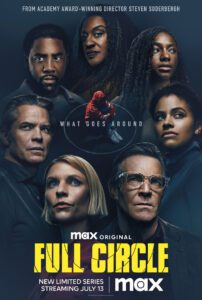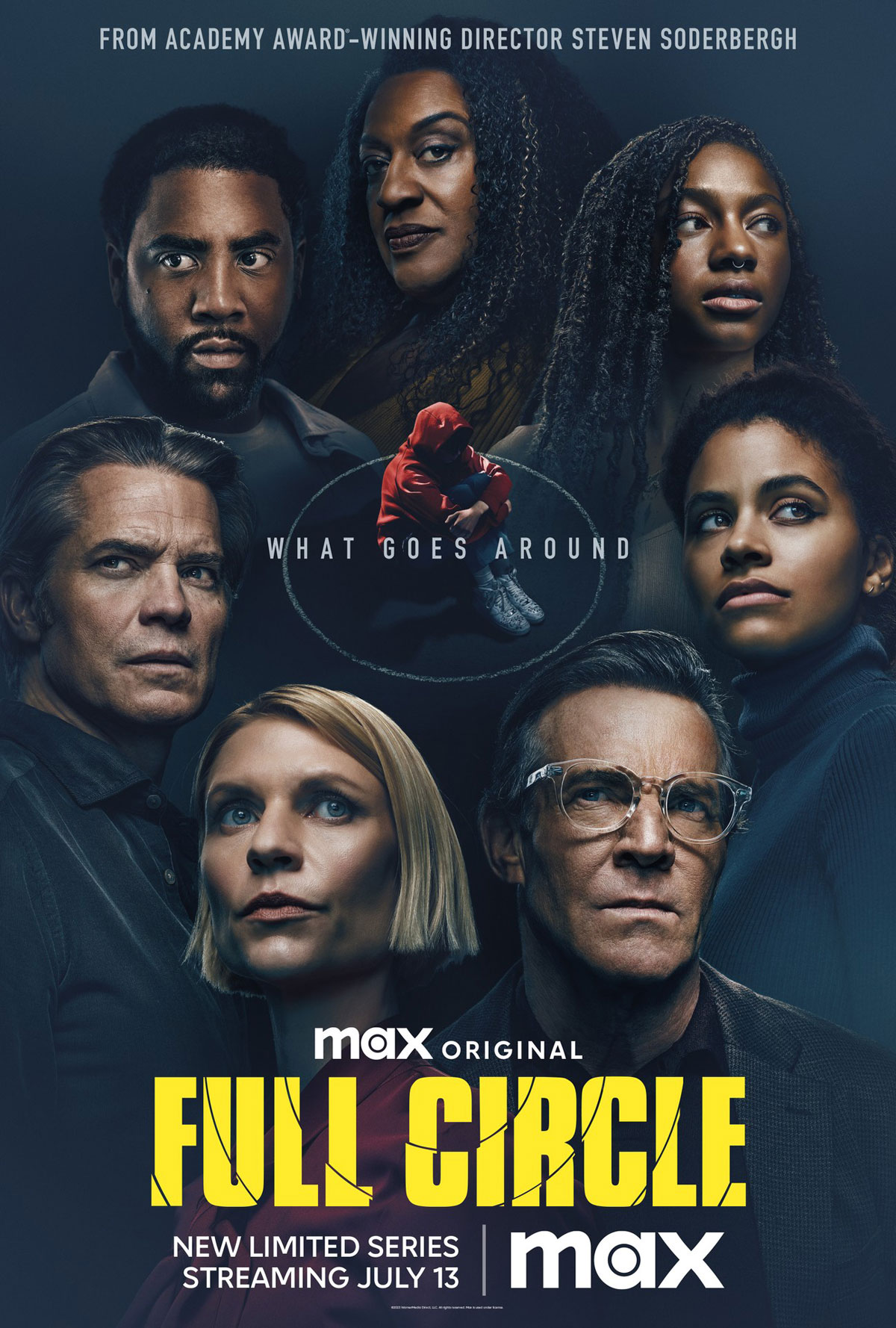
Service: Max
Release Year: 2023
Watch: Max
Have you ever watched something and almost immediately afterwards asked yourself if you actually watched what you watched? Not in like a shocked way. But in a “this thing has some well-known stars in it, was created by a well known creator and I feel like it was some sort of weird fever dream that only happened inside my own head.” Because absolutely nobody is talking about it. But, weirdly, Full Circle was not a figment. It is an actual series created by Steven Soderbergh, starring Claire Danes, Timothy Olyphant, Dennis Quaid, CCH Pounder and Zazie Beetz. And it exists. On Max no less.
The issue, I think, is the subject matter. Not an issue per se, but perhaps the blocker to wider popularity and word-of-mouth spread. Because it would go something like this: Ok, this rich, NYC couple’s son is kidnapped — but not really — and then something about Guyana (which is different than French Guiana and Ghana) and shady development deals that are avenged via some sort of voodoo enacted by a criminal enterprise that employs young indentured Guyanese to carry out said enterprise’s crimes, including the aforementioned kidnapping. It doesn’t exactly sell itself. People see the cast, hear “kidnapping” and are intrigued. But once the “foreign” thing comes into it and the international machinations and complications, you lose a very large chunk of people looking to just watch some TV. Not that I think Soderbergh — or anyone else — should dumb down their television, but it’s the most realistic thing I can point to to explain the utter zero this series has left in the TV landscape.
First, this show is dark. Not in terms of the subject matter — although it’s that too — but it seems like they shot 98% of it at night. Characters are constantly talking in dimly-lit rooms, walking out of the night under streetlights and just generally skulking in the shadows. And, look, I love NYC at night. But the pall of night overwhelms at times. It’s clearly a choice by Soderbergh to shoot in the dark, but it kind of makes the show seem samey-samey at times. Because we all know that the sun does eventually rise and that we don’t live our whole lives under cover of darkness. Even if it adds mystery and intrigue to our television. Second, the show is, at times, a bit confusing. Almost overly so. I think that all stems from the inciting event — a murder — which happens at the very start of the series with little to no explanation. What that event is about is only explained over time through the series. Again, I’m not trying to write the show, but if you’re going to introduce us to what I imagine to most folks is a little-known country and even a lesser known culture, a little exposition and build-up would start us off on more solid footing. As it stands, it feels like you start off from minute one already trying to play catchup plot-wise.
Once you do kind of get a handle on the initial crime and the subsequent fallout, it does fall into place. But some may have already lost the string. And, honestly, by the time the finale rolls around in episode six, I would have a little trouble reconstructing exactly who did what if someone were to ask me. And that may or may not be the point Soderbergh was trying to make. Because the take away here is less about an exciting or interesting crime show, but more about how young immigrants can be exploited by those willing to exploit them. The desperation of young men in Georgetown (Guyana, not D.C.) with little-to-no prospects being enticed to come to the U.S. by established Guyanese, who then remove their ability to leave and install them in their crime organizations as part of paying them back for freight to the U.S. is actually the more salient point.
I focused on that because, quite frankly, the whole kidnapping thing is kind of goofy. It’s the crux of the plot, but basing that on an inept case of mistaken identity feels like a pretty stupid device. Literally, this van full of dudes are supposed to kidnap Danes’ and Olyphant’s son off his bike at night in the park (which is a whole other unrealistic construction to get him there), but they snatch the wrong kid because he happens to be wearing the son’s hoodie and riding his bike (in another silly construct). They don’t have a photo of the kid they’re supposed to kidnap? After he protests that he’s not the right kid, they just keep telling him he is and don’t stop for a second and ask a few questions of him? Nope, they just go with it. For like the whole show! Even when it should be really, really obvious to anyone and everyone that they have the wrong kid. The kid’s grandfather (Quaid) is a public figure and super-well-known and the parents both work for him and are at public events with him. Do they not have Google? It would have taken them five minutes of searching to realize this teen isn’t the right teen. It just stretches credulity.
Also, the title Full Circle is both literal and metaphorical. As part of the ritual in this whole kidnapping and revenge plot masterminded by criminal entrepreneur, Savitri Mahabir (CCH Pounder), there are literal large chalk circles drawn in Washington Square Park. And I’m not certain if this is supposed to be an insider NYC joke, but nobody seems to notice or care about these odd giant circles that suddenly appear in the middle of this bustling spot (where everyone used to buy their illegal and formerly illegal substances, which were mostly oregano and baby powder). Again, it always seems to be nighttime in Washington Square Park, so perhaps people just don’t see them? I watched this whole series and I am still a bit lost as to what exactly is up with the circles, but it has something to do with this act of revenge closing the circle that was broken with the aforementioned inciting murder. And, on the metaphorical side, our young characters’ journey from Georgetown back to Georgetown is, I suppose, also a full-circle journey. So to speak.
There is also an odd tonal thing going on here. Danes does her usual huffing and puffing thing that she established in Homeland. But she’s frantic and serious, as usual. I know people love Olyphant, but he sometimes feels like he’s in a different show. He’s fine, but something about his voice and the volume of his delivery just doesn’t hit the marks it feels like it should. Dennis Quaid as celebrity idiot chef, Chef Jeff, with his rattail ponytail and stage energy also feels like a weird almost comic outlier in what should be a more serious endeavor. And then there’s Zazie Beetz. Her character makes absolutely no sense. She’s a postal cop who is clearly struggling with some sort of mental condition. Her character is all amped up and going rogue and just generally acting way outside of what you’d think would be the parameters of her job. Her boss, played by a put-upon Jim Gaffigan, seems to simultaneously humor and threaten her. The two of them are ostensibly the comic relief, but I’m honestly not certain that was the intention. It feels like Beetz’ role was a bolt-on to the original script and was written by an entirely different writer. As if the Max folks told Soderbergh he needed to add in a cop (albeit a postal cop) to provide some tension that was otherwise missing from the plot. She just kind of shows up here and there, doing whatever whenever she wants. But is always exactly where she needs to be when a character just happens to walk by. But we’re meant to understand it’s because she’s crazy! It’s a little absurd and feels super haphazard and unfinished.
I imagine this series will continue to not get much traction. Even if there are some interesting ideas here. Even some decent performances by some of the secondary actors. And I did enjoy chunks of it, but often bumped on how clunky it could be at times. Maybe the gap in programming with the writers’ and actors’ strike will make people dig a little deeper in the streamers’ catalogs. The quality here is certainly way better than any of the multitude of Chicago Whatevers and NCISes of the world, but it could be a challenge to gain an audience when you ask them to think a little. Even if what you’re thinking about it itself a little muddled.


